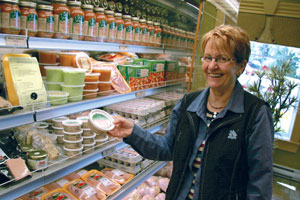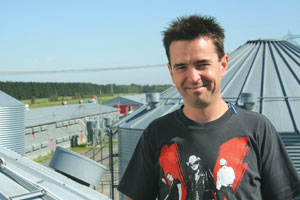
Ferme des Voltigeurs Turns 50
By André Dumont
Features New Technology Productiona family farm with a spot at the local farmers’ market.
Fifty years down the road, Ferme des Voltigeurs is still a family farm with a spot at the local farmers’ market.
Denise Turcotte was only 17 when she first took care of a stand at the Drummondville Farmers’ Market. She was replacing an aunt who was on a two-month maternity leave. It
was such a thrilling experience that a few months later, she was
opening her own stand.

|
|
| Denise Martel and son Bernard (below) Ferme des Voltigeurs have been part of the Drummondville Farmers’ Market for 50 years.
|
So began a great adventure that continues today, 50 years later. Denise Turcotte sold strawberries, raspberries and other produce from the family garden, along with eggs, and chicken she had slaughtered in the barn. That was in 1958, just before she met her future husband Georges Martel, with whom she would found a flourishing poultry business.
Today, Ferme des Voltigeurs is more than ever a pillar of the Drummondville Farmers’ Market. Its refrigerated counter inside the market hall is nine metres long. Every Friday between 7 a.m. and 7 p.m., at least eight employees serve more than 1,000 customers buying large or small chickens, sausages, marinated cuts, meat pies, cretons and other chicken specialties.
At the St-Charles-de-Drummond farm, Denise and Georges’s four children operate a business that includes chicken production, feed mixing, slaughtering and processing, on-farm sales and province-wide sales through distribution networks.
 Poultry production is Bernard’s responsibility. The eldest son, Dominique, is in charge of accounting and management. Georges Jr. takes care of marketing and administration. Their sister Nathalie oversees human resources. “We all joined the farm after our studies, with skills that complemented each other,” Bernard said.
Poultry production is Bernard’s responsibility. The eldest son, Dominique, is in charge of accounting and management. Georges Jr. takes care of marketing and administration. Their sister Nathalie oversees human resources. “We all joined the farm after our studies, with skills that complemented each other,” Bernard said.
Ferme des Voltigeurs’ slaughterhouse is busy two days per week with 25,000 grain-fed chickens from the farm. They are sold on site and at the market, but mostly in supermarkets and at specialty butcher shops across Quebec. Two to three days a week, generic chicken is slaughtered for other farmers.
The business got its start soon after Denise and Georges’s marriage in 1963.
Georges had been raised on a dairy farm, but had dreamt of breeding chickens. He first took a job in a company that built milk truck tanks.
The couple bought a rural property and built a house, with a room in the basement to slaughter the chickens Denise sold at the market. Towards the end of the ’60s, a small horse stable was moved to the property. It would become the first of several henhouses.
A separate slaughterhouse was built in 1974. It was adapted to provincial regulations in 1979. It is under federal inspection since 2006 and also has a HACCP certificate.
Ferme des Voltigeurs has always purchased chicken from other farmers, whom they trust to raise the grain-fed birds with great care. Its own production is spread over three sites, including rented buildings in Saint-Germain-de-Grantham and henhouses it owns in Saint-Cyrille-de-Wendover.
In 1985, Ferme des Voltigeurs branded itself as a pioneer of grain-fed chicken production. The grain-fed label has now lost part of its early prestige, so the Martels are now revising their feed procedures in order for their birds to qualify for an all-vegetable fed branding.
The farm also claims its chickens contain less fat than those available in most supermarkets. Voltigeur chicken loses less volume during cooking, Bernard says. “Our chicken is a little more expensive, but when you pull it out of the oven, it hasn’t melted down.”
For more than 15 years the Martels have made it a point to cool their chickens with air instead of water.
Experiments are now underway to achieve a fully antibiotic-free production. “We have tried products from several companies. We have had good and bad results, and we keep trying,” Bernard said.
About 40 per cent of the farm’s birds are now raised without antibiotics. Bernard, his brothers and their sister are convinced they will one day be able to raise all their flocks without antibiotics and market them as such.
Despite the company’s growth, the Drummondville Farmers’ Market has remained a central part of the sales strategy. “It’s a great place to be,” Bernard says. “It gives us direct contact with customers. We get comments and suggestions and we develop our products accordingly.”
Because the farmers’ market is only open one day a week, the Martel family decided to build and operate a meat shop on the farm. The whole assortment of chicken products is now available seven days a week. From whole chickens to spicy wings, cold cuts and spaghetti sauce, the Martels have thought of every chicken product they can sell.
With holidays approaching, the family business is gearing up to offer its own large (20-pound) turkeys.
Turning 50 is one more good reason for Ferme des Voltigeurs to keep focused on its recipe for success. There is no question of giving up on the quality and flexibility offered by on-farm slaughtering. Direct customer sales were there in the start and they are there to stay.
Other Ferme des Voltigeurs shops could be opened and more specialty products will find their way into supermarkets.
By going for all-vegetable fed chicken, with plans to switch in a few years to antibiotic-free production, Ferme des Voltigeurs is doing whatever it takes to remain at the forefront of the poultry industry for another half century.
Print this page